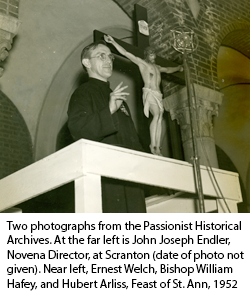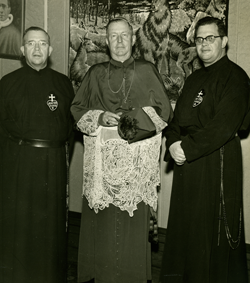Information Update - Fall 2012
Passionist Historical Archives Move to Weinberg Library
- In July, Special Collections became the custodian of the Passionist Historical Archives. The Passionists were planning to close their research facility in Union City, N.J., and were looking for a home for the collection where it would be open to the public research. History department faculty Roy Domenico, Ph.D., and Sean Brennan, Ph.D., were aware of the closing of the facility and brought the availability of the collection to the attention Weinberg Library Dean Charles Kratz and Special Collection Librarian Michael Knies. After negotiations with Passionist leadership, in collaboration with Passionist Province Historian Father Rob Carbonneau C. P., an agreement was reached for the Weinberg Library to serve as the new home for the Passionist Historical Archives.
- The Passionist Congregation was founded by the Italian St. Paul of the Cross (1694-1775). Pope Clement XIV gave solemn approval to the Passionists in 1769. In 1852 the first band of Passionists arrived in Pittsburgh. In 1902 the Passionists arrived in Scranton and built St. Ann's Monastery. Since 1924, the monastery has been home to St. Ann's Novena every July.
- The collection contains diversified sources on Passionist ministries from the past 160 years. This includes archival sources that offer insight into the prayer life and culture of the Passionist priests and brothers, as well as documentation pertaining to past and existing monasteries in the eastern United States. Other sources reveal the dynamic and diverse ministry of the Passionists. Topics open to researchers include the study of domestic parish missions and Catholic devotions, the spirituality of the 20th century retreat movement for men and women, the work of the media as seen via the Passionist publication of The Sign Magazine (a Catholic monthly from 1921 to 1982), and ministry in Catholic radio and TV in the post-World War II era. Notable as well are resources on the Passionist work with Black Catholics in the 1920s to 1950s; and missionary ventures to Argentina and Mexico in the last decades of the 19th century and the Philippines and Jamaica and the West Indies since the mid-1950s. Included as well is a collection of books on Passionist history and spirituality.
- About 20 percent of the collection will not immediately be coming to Scranton.The Passionist China Collection portion has been sent to the Ricci Institute at the University of San Francisco, where it will be digitized and cataloged under the direction of Ricci Institute Director WU Xiaoxin and Father Rob Carbonneau. After the digitization project has been completed, the plan is for the China Collection to be transferred to Weinberg Library to join the rest of the collection.
- Access to the collection will be available during regular Special Collections hours, as well as by appointment. The Passionist Historical Archives website will be transferred to Weinberg Library.Additional information and resources will be added to the website in the future. Father Carbonneau will provide training and advice on providing research access to the collection for Special Collections staff as we endeavor to understand the depths of the historical material for which we will be serving as custodian.
-


- In the future, we expect that there will be public programming based around the Passionist Historical Archives in conjunction with Scranton's History Department. For instance, exhibits will be mounted in the Heritage Room concerning various aspects of Passionist history and missionary work.
- For further information please contact Michael Knies 570-941-6341 or Michael.Knies@Scranton.edu.
—Michael Knies and
Father Rob Carbonneau, C. P.
Father Rob Carbonneau, C. P.

